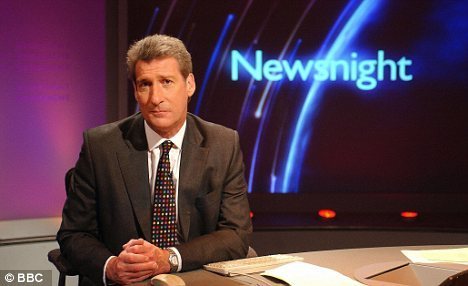Why Jeremy Paxman Might Not Be a conservative
Please note that's ' a conservative;', not a 'Conservative'. As I so often have to insist during these discussions about the mighty appointed BBC Presenterocracy, it's not *Party* affiliations I'm interested in, but which side of the great moral, cultural and social divide the person is on.
Mr Paxman is on record as saying that he has voted for 'all the major parties. "More than the main three, oh certainly." This was in an interview with Decca Aitkenhead of 'the Guardian'. As readers here will know, I don't regard the Conservative Party as being particularly conservative, so that doesn't necessarily tell us much about the subject in question.

Then there's the past. Mr Paxman says he was a communist at school, and famously described himself as a socialist when he applied, in his twenties, for the editorship of the Left-wing 'New Statesman' magazine.
All right, you say, so people change their minds. As indeed they do, and should.
But (in answering the question I pose above) I can offer two significant pieces of information. So far as I can discover, Mr Paxman is not married to the mother of his children, despite the relationship being apparently long and happy. In my generation, such a situation generally means that those involved (one thinks also of Alastair Campbell and his unwife, Fiona Millar) do not approve of marriage. This position is neither particularly uncommon nor controversial among the metropolitan Guardian-reading left. But it is not a conservative view.
Second, let us return to the 'Guardian' interview with Ms Aitkenhead for a moment (this was published on 9th February 2009).
She asked him if his children were educated privately. Here's what happened: 'When I ask if he educates his children privately, he gets very defensive. "I'm very ready to be hung for anything that I do, but I think their lives are their own." But they don't decide where they go to school. "Yes, but it is they who go to school." I'm not asking you to name their school, I say, I'm just asking if you educate your children privately. "Mind your own business." '
Now, I have educated my children privately since the moment I could afford to do so. I'd rather not (I'd have much more disposable income if I didn't). But I regard it as a defensible, wise choice. I'd rather the state schools were capable of doing what private schools do, and that they didn't do some of the things that private schools tend not to do - that is, undermining the messages children get at home, with multi-culti, anti-Christian, PC propaganda.
I don't think the generality of private schools are by any means immune from many of the weaknesses of modern education, but they are not as bad as the generality of state schools. I know there are some exceptional state schools, but - despite being rather well paid - I can't afford to live in their catchment areas, which, thanks to the requirement for large sums of capital, is (oh, what a lovely paradox) often far more expensive than paying fees for a few years.
I think there are strong, powerful reasons for my doing this.
On the other hand, Leftists (see the chapter on 'Class War' in my book 'The Abolition of Britain') see something morally questionable in using private schools, and when they do it, often do it reluctantly. Among affluent metropolitan leftist types, it's a constant source of anxiety (see the long and fascinating quotation from Nick Cohen about this in my 'Cameron Delusion') . It cannot always be solved by such dodges as getting your children into Roman Catholic schools that are in all important respects grammar schools. Or by moving to the hugely expensive and tiny catchment areas of Camden Girls or William Ellis, among the few excellent private secondary schools in London. Sometimes, and this really hurts, the whole chequebook has to come out or the children get hurt.
For these people, private education is morally troubling. That's why David Cameron, who wants to appeal to precisely this class of person in the media, has wangled his child into a simply lovely C of E primary rather than pay the fees he could easily afford (though things will get much more difficult once secondary schools are involved). That's why Ms Aitken, who is a very sharp interviewer, asked the question. She knew it was profoundly revelatory. And that is why Mr Paxman, an equally sharp interviewer, didn't answer it.
In general, I'd also ask my 'Paxman is a conservative' theorists to see if they can answer this question. Mr Paxman never had any trouble before 1997 interviewing Tory ministers from an oppositional (and therefore leftist) point of view. His job, you might say. He has to play Devil's advocate, etc. But can anyone remember him interviewing a Blair-era Labour minister in a similarly hostile fashion, from the position of a *conservative* Devil's advocate? Not as a disappointed leftist Devil's advocate, please note (the standard anti-Blair critical position of the post-1968 media classes). But from a socially, morally, culturally ( and constitutionally) conservative point of view?
Relevantly, I can recall during my long-ago stint as an (openly partial) presenter on the then 'Talk Radio', interviewing William Hague, and wishing afterwards that I had been able to find it in myself to be harder on him. But the muscle and force just hadn't been there.
Peter Hitchens's Blog
- Peter Hitchens's profile
- 298 followers



